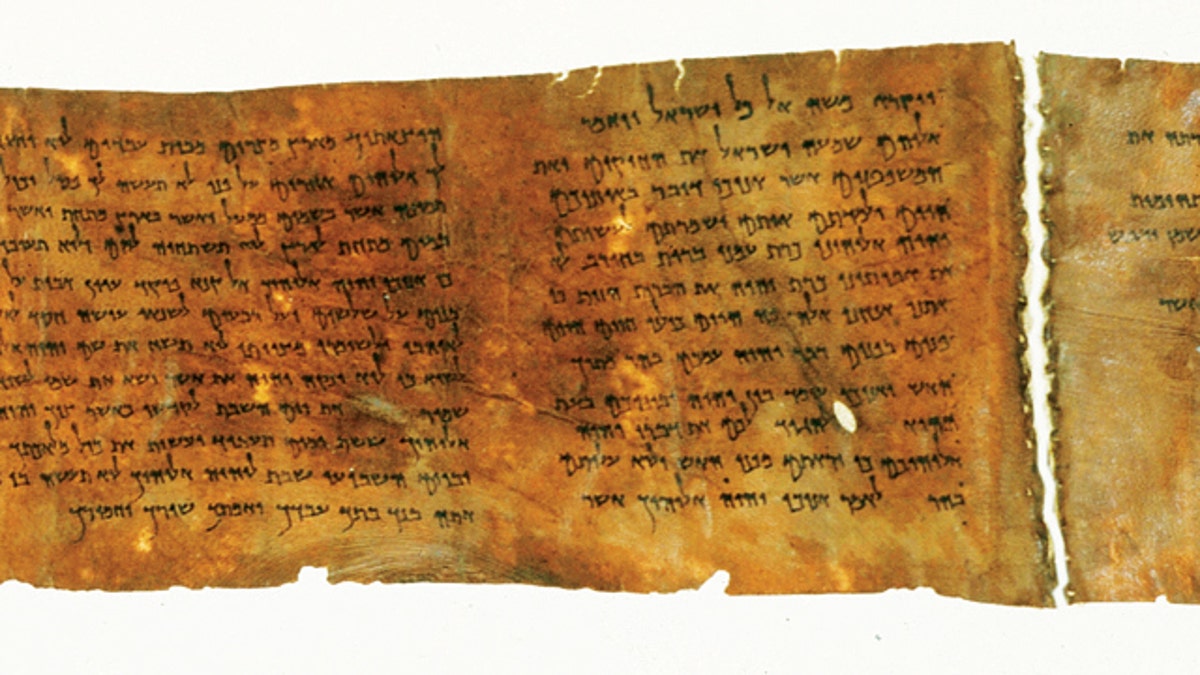
A portion of the oldest complete copy of the Ten Commandments, on display potentially for the final time in New York CIty's Times Square. (Israel Antiquities Authority)
Just in time for the holidays, the oldest complete copy of the Ten Commandments has gone on public display in New York City -- and possibly for the last time.
The 18-inch long parchment, delicately stitched together and inscribed on animal skin, is 2,000 years old, and it is so fragile that this may be the last opportunity for the public to see it up close, antiquities experts say.
It was added Thursday, Dec. 15, to the Discovery Times Square exhibit, “The Dead Sea Scrolls: Life and Faith in Biblical Times," where it will be on display only until Jan. 2. After that, it will be returned to a protective vault in Jerusalem.
"Each piece of the Scrolls is carefully monitored for its current condition," show curator Risa Levitt Kohn, a professor of religious studies at San Diego State University, told FoxNews.com. Variances in temperature, humidity and light continue to age the parchment, so there are strict rules about how much time the documents can be illuminated. The last time the Ten Commandments scroll was exhibited in Toronto, Canada, in 2009, it was restricted to just 80 hours of public viewing.
Tatiana Treiger, a conservator with the Israel Antiquities Authority, is personally handling the installation of the scroll and will watch over it during its time in New York. "Our job is a lot like a doctor's: do no harm," Treiger said.
The story of how the Ten Commandments were conveyed to Moses by God on stone tablets is not recorded in this scroll. The stone tablets themselves were supposedly held in the Ark of the Covenant, as famously depicted in Hollywood movies, such as Raiders of the Lost Ark.
Somewhat less spectacularly, the scroll is simply a copy of those commandments. But its very existence -- the scroll dates from about 30 B.C. and survived for thousands of years hidden in hills near the Dead Sea in Israel -- is nothing short of astonishing.
It is part of what was a secret ancient library concealed in a series of 11 caves, now known as the Dead Sea Scrolls. The entire collection comprises approximately 900 different texts written in Greek, Aramaic and ancient Hebrew that were uncovered in the 1940s and '50s. The Ten Commandments scroll itself was found in Cave 4, where a majority of the documents were discovered.
"[Cave 4] was the motherload of the Dead Sea Scrolls," Kohn said.
The only other copy of the Ten Commandments dating from around the same era is the Nash Papyrus. It's 50 to 100 years older than the scroll copy, but the Nash document does not contain all 10 commandments and is in extremely fragile fragments. The only other ancient records of the Commandments date from at least 1,000 years later.
With its proscriptions against theft, murder and adultery, some people will note the irony of the Ten Commandments scroll appearing in what was once considered the center of sin in New York City -- Times Square.
"What is amazing is how much this text has influenced Western secular culture in terms of laws and rights even today," Kohn told FoxNews.com.
The scroll is expected to draw thousands of additional visitors, and long lines were already forming on its first day in the exhibit.
While the Ten Commandments scroll will return to its vault after the New Year, the rest of the exhibit -- including 500 artifacts and 10 other examples from the Dead Sea Scrolls -- will continue at the Discovery Times Square exhibit until April 15.








































